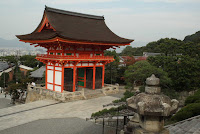The wake-up call came at 4 AM but I had been lying awake for at least an hour before that. I soon realized that I felt pretty good and the "Khumbu aches and delerium" of the previous night were gone. Strange? The porters came around each tent with cups of hot tea to wake us up. It was still pitch dark except for the brilliance of the stars, which were out in all of their naked glory - not a cloud in the sky! It was difficult and frustrating for me to pack my duffle at such an early and cold hour but I struggled through it. In the end, I decided I would try for the peak after all!
We were walking at just after 5:00 AM with headlamps and the light from the many stars. Ahead of us stood the cone of Pumo Ri, a majestic mountain that stands 23,435 feet above sea level. Directly above it was the Pole star shining as if it were located right on top of its cone. The air at this altitude containes only 50% of the oxygen as at sea level and the going was quite slow. But I felt strong and at about 7:15, had reached the summit. What a thrill! Unfortunately, Helen did not feel up to making the final ascent and there were only 8 of us who made the final push. She was troubled by altitude sickness and made it about half way up before turning back. I was sorry she didn't make it, but she did get just as good a view of Mt. Everest as we did. The others in our group who made it to the summit were Norm Henderson, Don Webster, Chris Hansen-Nelson, Clint Gelotte, Louise Georgette, David Keeber, and Diane Wishnev. George Abbott, Jeff Engel, and Bill Foote had summited the previous day, so in ll, 11 of our original 19 trekkers made the summit. I do not consider those who did not make the summit unsuccessful - in fact, anyone one of us could have been feeling bad from the altitude on this particular day and would not have attempted it. It was the luck of the draw really. In any event, we were on the summit of Kala Patar at about 18,500 feet. We viewed Everest - only 6.3 miles away to its top - in brilliant, cloud-free daylight. What an accomplishment it felt was!!

After summiting Kala Patar, we munched a quick breakfast at 10:so AM and hiked down all the way to Pheriche! This was a 4,000 foot descent but we made it. A 13 hour day on the trail at high altitude! We made it.
 A troupe of little girls and boys dancing for us as the carnival music blared from on old tape machine. Quite a contrast indeed from what that word, Vietnam, has formerly meant to all of us in the U.S.
A troupe of little girls and boys dancing for us as the carnival music blared from on old tape machine. Quite a contrast indeed from what that word, Vietnam, has formerly meant to all of us in the U.S.









